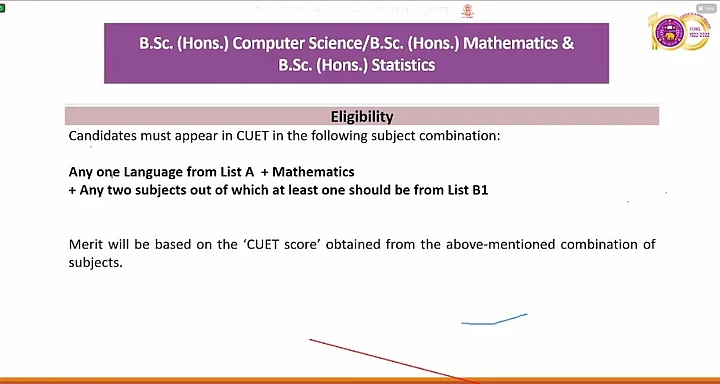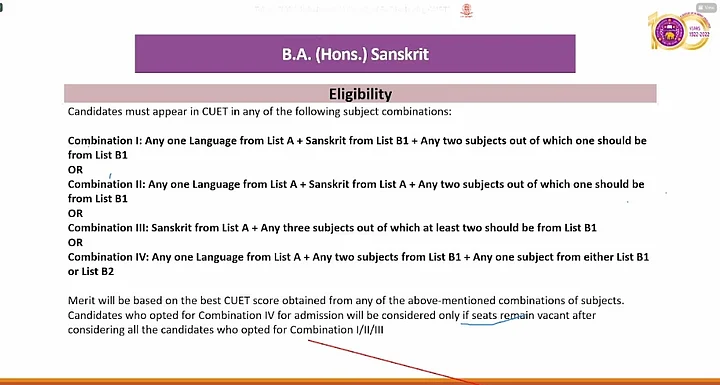For the first time, the Delhi University (DU) will be admitting students on the basis of their Common University Entrance Test (CUET) scores rather than Class 12 exam results.
While students have a myriad of options to choose from, there are some subject-specific requirements that they have to be mindful about.
Each course and subject have their own possible combinations consisting of compulsory and optional subjects that will be considered while calculating merit, explained DU’s Dean Admissions Haneet Gandhi.
What are the different requirements? How do you choose subjects for different courses? Here's all you need to know.
Which subjects can students sit for?
Most candidates have to appear for at least one language course, and up to six domain specific subjects.
The language section is divided into two parts: 1A and 1B.
1A comprises Hindi, Marathi, Gujarati, Tamil, Telugu, Kannada, Malayalam, Urdu, Assamese, Bengali, Punjabi, and Odia.
1B consists of 19 subjects: French, Spanish, German, Nepali, Persian, Italian, Arabic, Sindhi, Kashmiri, Konkani, Bodo, Dogri, Maithili, Manipuri, Santhali, Tibetan, Japanese, Russian, and Chinese.
There are 27 domain-specific subjects. These 27 subjects have been divided into two lists: B1 and B2.
B1 includes: Accountancy/Book Keeping, Biology/ Biological Studies/ Biotechnology, Business Studies, Chemistry, Computer Science/ Informatics Practices, Economics/Business Economics, History, Home Science, Legal Studies, Environmental Studies, Mathematics, Physics, Political Science, Psychology, Sociology, Anthropology, and Sanskrit.
B2 includes the following subjects: Engineering Graphics, Entrepreneurship, Knowledge Tradition Practises in India, Fine Arts/ Visual Arts/ Commercial Arts, Teaching Aptitude, Agriculture, Mass Media/Mass Communication, Physical Education/NCC/Yoga, and Performing Arts.
The third part is a general test and only candidates for a few specific courses will have to sit for this.
How many sections should I sit for?
This depends on the course you want to choose.
Most candidates have to appear for at least one language test and at least three other tests.
They can sit for up to six domain-specific tests but the best of four will be counted.
The dean explained that the best of the possible combinations will be considered while calculating their score. She said that each programme will give students some amount of flexibility and choice.
I want to apply for a science course. Which subjects should I choose?
Candidates applying for science, math, and technology courses will have to sit for three subjects and one language. Their language course will not be considered while calculating their scores. However, they have to get a minimum of 30 percent in the language course.
For example, those who are applying for BSc (Hons) in Botony, Biological Sciences or Zoology, will have to attempt Physics, Chemistry, and Biology.
Meanwhile students who are applying for BSc (Hons) in Chemistry, Physics, and Polymer have to appear for Physics, Chemistry, and Mathematics.
What about those who want to apply for a mathematics course?
Those who want to pursue courses in Mathematics, Computer Science, and Statistics will have to appear for at least one language, mathematics and any two subjects from Section 2, with at least one of them from Section B1.

Requirements for Computer Science, Mathematics and Statistics.
(A Delhi University presentation)
Which subjects will Bachelors in Arts candidates sit for?
Candidates applying for Bachelors in Arts will have to apply for one language and three subjects from section 2. Those applying for Philosophy, Applied Psychology, History, Sociology, Social Work, Geography, Political Science, and Psychology will appear for one language test and two subjects from Section B1 and one from B1 or B2.
Meanwhile, for those who are applying for Economics, maths is a mandatory subject. In addition to this, they will appear for one language and any two other subjects, one of which needs to be from B1.
What about language courses?
Students who want to pursue language courses can sit for the language exam that they want to study. However, they can also appear for other languages if they have not previously studied the said language.
For instance, someone applying for Punjabi can sit for Punjabi in the first section, any two subjects from B1 and one subject from B1 or B2. A similar structure is applicable for other language courses such as French.
Meanwhile, four combinations are possible for Sanskrit since Sanskrit is also listed under domain-subjects.

Four possible combinations for the Sanskrit course.
(A Delhi University presentation)
How do students apply for other courses, such as BA and BBA?
For admission to courses such as BBA, BBE, and BMS, Mathematics is mandatory. They can sit for Section 3 which is the general test. Similarly for the BEd course, students can sit for any language and two subjects from B1 and one subject from either B1 or B2. They will have to have a minimum of 50 percent in their board examinations.
Those Applying for BA (Programme) can opt for one of the two combinations; one language and three subjects with atleast two from B1 or a language, one subject and Section 3 of CUET.
Students who are applying for BA in Music and Physical Education will sit for CUET as well as a performance-based test.
Those who have studied performing arts previously, can attempt the performance arts questions which come under Section 2 of the exam. The weightage of CUET and performance-based tests will be 50:50.
Illustrative examples will be live on Delhi University's website soon.
(At The Quint, we are answerable only to our audience. Play an active role in shaping our journalism by becoming a member. Because the truth is worth it.)
